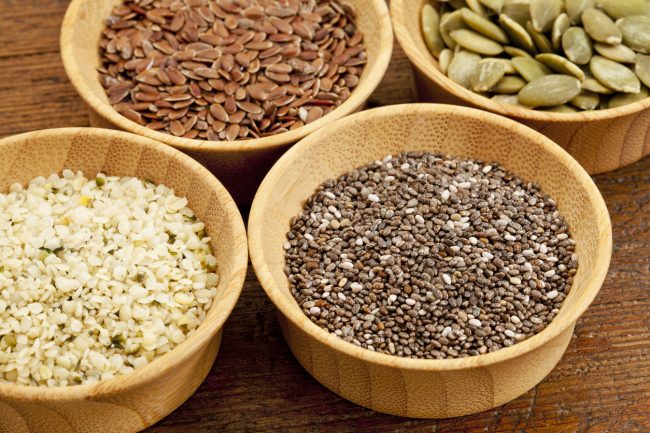In case you haven’t heard, seeds are no longer just for the birds. In fact, they’re becoming a staple for health-conscious snack addicts across the globe.
Much like nuts (another super-smart snack food!), seeds manage to squeeze several essential nutrients into a very tiny package. They’re an excellent natural source of antioxidants, protein, dietary fiber, healthy fats, vitamins and minerals. Factor in their delicious flavor, low calorie count and grab-and-go convenience, and it’s no wonder these nutritional powerhouses are so rapidly gaining in popularity!
Before you start snacking…
There are seemingly countless varieties of seeds, but not all seeds are created equal. Before we get to the good stuff (which seeds to enjoy and how), it’s important to note that some seeds should be avoided altogether. Apple seeds, for instance, contain trace amounts of cyanide, which can be fatal to humans. Although it would take many, many seeds to produce ill effects, it’s probably best to let this less-than-desirable part of the apple go. The same is true of pear seeds and apricot, cherry, peach and plum pits (not technically seeds, but still good to know!).
On your marks, get set, snack!
We’ve already established that there are many different kinds of seeds. Following are seven of the most popular types for snacking, along with some simple suggestions for incorporating them into your diet:
1. Chia seeds: Packed with antioxidants, calcium and fiber, chia first entered the scene in the ‘80s with those wildly popular Chia Pets. Today, the seeds are a delicious, nutritious addition to puddings, smoothies, baked goods and salads. Or you can use them as a thickener for soups and gravies. Check out 10 tasty things you can do with chia seeds for more recipe inspiration.
Our pick: Better Body Foods Organic Chia Seeds
2. Flax seeds: Rich in fiber, lignans (which contain plant estrogen and antioxidant qualities) and beneficial omega-3 fats, flax seeds can add crunch to cooked cereals, snack bars, granola and crackers. They can also be ground into flaxseed meal and incorporated into recipes for breads, muffins and baked goods.
Our pick: Bob’s Red Mill Organic Natural Raw Whole Flaxseeds
3. Hemp seeds: A great source of protein and omega-3 fats, hemp seeds can add delicious nutty flavor to cereals, yogurts, smoothies and salads. You can also use them in place of breadcrumbs to coat fish and chicken. We’re loving this sun-dried hemp seed salad dressing recipe!
Our pick: Nutiva Organic Raw Shelled Hempseeds
4. Pomegranate seeds: Sweet and slightly tangy in flavor, pomegranate seeds contain fiber, potassium and vitamins C and K, among other important nutrients. Enjoy them plain, stir them into rice dishes or toss them into yogurt, pudding, flatbreads and all manner of salads and side dishes including this pomegranate pistachio quinoa stuffing.
5. Pumpkin seeds: Powerful pumpkin seeds contain a wide range of nutrients, including magnesium, copper, protein and zinc. Roast them, mix them into in oatmeal and yogurt, or add them to recipes for granola, burgers, veggie burgers and baked goods.
Our pick: Vitacost Organic Shelled Raw Pumpkin Seeds
6. Sesame seeds: These tasty seeds are a wonderful natural source of iron, protein and fatty acids. In addition to enjoying ever-popular sesame chicken and beef and the occasional sesame seed bun, try sprinkling these smart seeds over salads and veggie dishes, or using them to make tahini.
Our pick: NOW Foods Real Food Organic Sesame Seeds
7. Sunflower seeds: Last, but definitely not least, are protein-rich sunflower seeds. Snack on them plain or flavor them with herbs, such as cumin and garlic powder. You can also substitute them for pine nuts in pesto recipes, add them to trail mix and toss them into salads.

